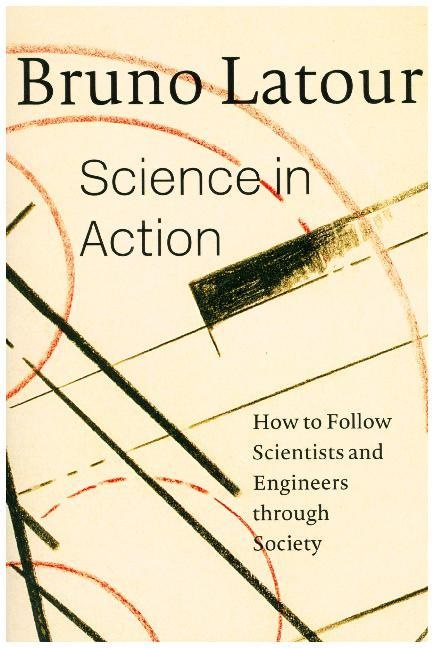Share
Fr. 61.60
B. LaTour, Bruno Latour, Latour Bruno
Science in Action New Edition - How to Follow Scientists and Engineers Through Society
English · Paperback / Softback
Shipping usually within 3 to 5 weeks
Description
Science and technology have immense authority and influence in our society, yet their working remains little understood. The conventional perception of science in Western societies has been modified in recent years by the work of philosophers, sociologists and historians of science. In this book Bruno Latour brings together these different approaches to provide a lively and challenging analysis of science, demonstrating how social context and technical content are both essential to a proper understanding of scientific activity. Emphasizing that science can only be understood through its practice, the author examines science and technology in action: the role of scientific literature, the activities of laboratories, the institutional context of science in the modern world, and the means by which inventions and discoveries become accepted. From the study of scientific practice he develops an analysis of science as the building of networks. Throughout, Bruno Latour shows how a lively and realistic picture of science in action alters our conception of not only the natural sciences but also the social sciences and the sociology of knowledge in general. This stimulating book, drawing on a wealth of examples from a wide range of scientific activities, will interest all philosophers, sociologists and historians of science, scientists and engineers, and students of the philosophy of social science and the sociology of knowledge.
List of contents
Acknowledgements Introduction Opening Pandora's Black Box PART I FROM WEARER TO STRONGER RHETORIC Chapter I Literature Part A: Controversies Part B: When controversies flare up the literature becomes technical Part C: Writing texts that withstand the assaults of a hostile environment Conclusion: Numbers, more numbers Chapter 2 Laboratories Part A: From texts to things: A showdown Part B: Building up counter-laboratories Part C: Appealing (to) nature PART II FROM WEAR POINTS TO STRONGHOLDS Chapter 3 Machines Introduction: The quandary of the fact-builder Part A: Translating interests Part B: Keeping the interested groups in line Part C: The model of diffusion versus the model of translation Chapter 4 Insiders Out Part A: Interesting others in the laboratories Part B: Counting allies and resources PART III FROM SHORT TO LONGER NETWORKS Chapter 5 Tribunals of Reason Part A: The trials of rationality Part B: Sociologics Part C: Who needs hard facts? Chapter 6 Centres of calculation Prologue: The domestication of the savage mind Part A: Action at a distance Part B: Centres of calculation Part C: Metrologies Appendix 1
About the author
Bruno Latour wurde 1947 im der burgundischen Kleinstadt Beaune als Sohn einer Winzerfamilie geboren. Nach einem Studium der Philosophie und Anthropologie promovierte er 1975 an der Universität Tours. 1979 veröffentlichte Latour zusammen mit dem britischen Soziologen Steve Woolgar Laboratory Life, das Ergebnis seiner Feldstudien im Labor des späteren Nobelpreisträgers Roger Guillemin. Dabei konnte Latour aufzeigen, welche Rollen rhetorische Strategien und technische Artefakte bei der "Konstruktion wissenschaftlicher Tatsachen" spielen. Mit dem 1987 erschienenen Science in Action weitete Bruno Latour diese zunächst sozialkonstruktivistische Argumentation auf das Gebiet der Technik aus. Er entwickelte zusammen mit anderen Soziologen, vor allem Michel Callon und John Law, die Akteur-Netzwerk-Theorie, die über den Sozialkonstruktivismus hinausgeht. Anders als dieser geht die Akteur-Netzwerk-Theorie nicht davon aus, dass Technik und Wirklichkeit sozial konstruiert sind. Vielmehr wird davon ausgegangen, dass Technik/Natur und das Soziale sich in einem Netzwerk wechselseitig Eigenschaften und Handlungspotentiale zuschreiben. Latour entwickelte später auf Basis dieser Überlegungen mit "Wir sind nie modern gewesen" und "Das Parlament der Dinge" eine Kritik der "modernen" Gesellschaft. 1987 erfolgte die Habilitation an der Ecole des Hautes Etudes en Sciences Sociales. In den Science Wars der 90er Jahre wurde Latour unter anderem von Alan Sokal heftig kritisiert. In "Die Hoffnung der Pandora" setzte sich Latour mit dieser Kritik auseinander. 1982 wurde er Professor für Soziologie an der Ecole Nationale Supérieure des Mines in Paris. Neben seiner wissenschaftlichen Tätigkeit im engeren Sinne kuratierte er zusammen mit Peter Weibel die Ausstellungen Iconoclash (2002) und Making Things Public (2005) am Karlsruher Zentrum für Kunst und Medientechnologie. 2008 wurde Bruno Latour mit dem "Siegfried Unseld Preis" ausgezeichnet im Jahr 2013 erhielt er den "Holberg Prize".
Summary
Emphasizing that science can only be understood through its practice, the author examines science and technology in action: the role of scientific literature, the activities of laboratories, the institutional context of science in the modern world, and the means by which inventions and discoveries become accepted.
Product details
| Authors | B. LaTour, Bruno Latour, Latour Bruno |
| Publisher | Harvard University Press |
| Languages | English |
| Product format | Paperback / Softback |
| Released | 01.07.1988 |
| EAN | 9780674792913 |
| ISBN | 978-0-674-79291-3 |
| No. of pages | 288 |
| Dimensions | 150 mm x 230 mm x 20 mm |
| Subjects |
Natural sciences, medicine, IT, technology
> Natural sciences (general)
Science: general issues, SCIENCE / General |
Customer reviews
No reviews have been written for this item yet. Write the first review and be helpful to other users when they decide on a purchase.
Write a review
Thumbs up or thumbs down? Write your own review.

